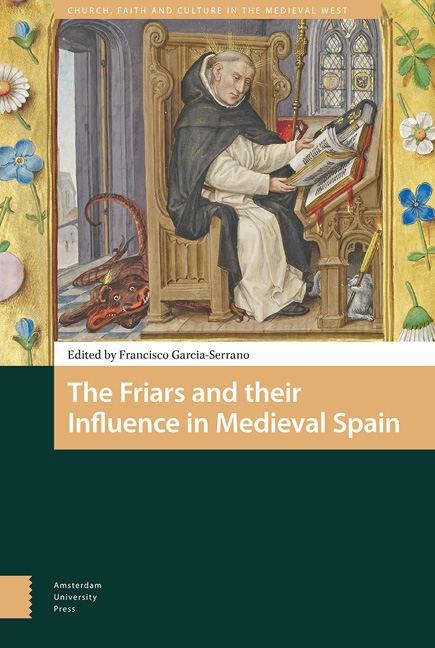Book contents
- Frontmatter
- Contents
- Abbreviations
- List of Illustrations
- Acknowledgements
- Introduction
- 1 Dominicus Hispanus
- 2 Ramon de Penyafort and His Influence
- 3 The Mendicant Orders and the Castilian Monarchy in the Reign of Ferdinand III
- 4 Ramon Marti, the Trinity, and the Limits of Dominican Mission
- 5 Narrative and Counter-Narrative: Dominican and Muslim Preaching in Medieval Iberia
- 6 The Poor Clares of Alcocer and the Castilian Crown (Thirteenth to Fifteenth Centuries)
- 7 Friars and Nuns: Dominican Economy and Religious Identity in Medieval Castile
- 8 Networks of Dissent and the Franciscans of the Crown of Aragon
- 9 Faction, Politics, and Dominican Inquisitors in the Fourteenth-Century Crown of Aragon
- 10 Sutzura e Viltat Carnal: The Place of Sin and Lust in the Treatises of the Franciscan Francesc Eiximenis (c.1400)
- 11 Valencian Dominicans Beyond the Convent of Santo Domingo
- 12 Ferdinand of Antequera and Santo Domingo el Real de Toledo: Patronage, Advice, and Spiritual Favour (c.1390–1416)
- Index
3 - The Mendicant Orders and the Castilian Monarchy in the Reign of Ferdinand III
Published online by Cambridge University Press: 16 February 2021
- Frontmatter
- Contents
- Abbreviations
- List of Illustrations
- Acknowledgements
- Introduction
- 1 Dominicus Hispanus
- 2 Ramon de Penyafort and His Influence
- 3 The Mendicant Orders and the Castilian Monarchy in the Reign of Ferdinand III
- 4 Ramon Marti, the Trinity, and the Limits of Dominican Mission
- 5 Narrative and Counter-Narrative: Dominican and Muslim Preaching in Medieval Iberia
- 6 The Poor Clares of Alcocer and the Castilian Crown (Thirteenth to Fifteenth Centuries)
- 7 Friars and Nuns: Dominican Economy and Religious Identity in Medieval Castile
- 8 Networks of Dissent and the Franciscans of the Crown of Aragon
- 9 Faction, Politics, and Dominican Inquisitors in the Fourteenth-Century Crown of Aragon
- 10 Sutzura e Viltat Carnal: The Place of Sin and Lust in the Treatises of the Franciscan Francesc Eiximenis (c.1400)
- 11 Valencian Dominicans Beyond the Convent of Santo Domingo
- 12 Ferdinand of Antequera and Santo Domingo el Real de Toledo: Patronage, Advice, and Spiritual Favour (c.1390–1416)
- Index
Summary
Abstract
The mendicant orders spread in Castile closely with the strong co-operation of the crown. Although the information we have is insufficient and often legendary, it allows us to establish relationships and interests between the king and the friars. This chapter focuses on the actions of King Ferdinand III and analyses them in two areas: in Old Castile and in the new Castilian territories won in the south thanks to the advance of reconquest. The policies of the king were closely related to those of his mother, Berenguela I, and especially benefited the Order of Preachers. As a result, a special bond was established between the Castilian Crown and the Dominicans which would long remain.
Keywords: Dominicans, King Ferdinand III, medieval Castile, religious history
The reign of Ferdinand III (1217–1252) coincided with the origins and development of the mendicant orders in Castile. The two great institutions of the Franciscans and Dominicans shared with the king a common cause, and the striking geographical expansion which resulted from their itinerant pastoral activism, apostolic zeal, and evangelizing missionary purpose was in tune with the major political concerns of a monarch who dramatically expanded Castilian territory. The institutional structures and ideals of the new orders are well known. According to tradition, Ferdinand so identified with their proposals that he became a tertiary Franciscan. But what type of relationship did Ferdinand have with them and how should we assess it? Answers to these questions require us to analyse the religious actions of the king in terms of his political agenda as he developed ties between the crown and mendicant friars and nuns.
First Ties between the Mendicants and the Crown
The traditions of mendicant historiography have aimed to link the Hispanic origins of Franciscans and Dominicans with the monarchy. The chronicles describe this relationship with the Castilian monarchs at the outset because the friars must have sought their permission in order to found their houses. In some cases the chroniclers described the presentation of letters of recommendation from Pope Honorius III, although today there is only actual evidence of letters addressed to the Hispanic clergy in favour of the Dominicans.
- Type
- Chapter
- Information
- The Friars and their Influence in Medieval Spain , pp. 61 - 84Publisher: Amsterdam University PressPrint publication year: 2018



